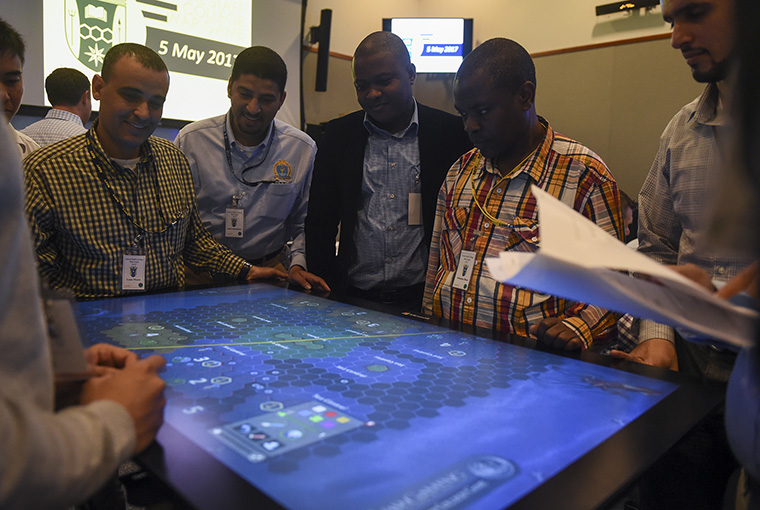Naval War College wargame gets technology upgrade

NEWPORT, RI – The capstone wargame for international students at U.S. Naval War College (NWC) has undergone a huge improvement this year, replacing oversized game boards and 'paper ship' game pieces with a new computer application that uses touch-screen technology and allows multiple player usage.
The 65 students taking the intermediate-level course through the Naval Staff College (NSC) are now using cutting-edge technology in their annual year-end event, which took place May 5.
NSC courses are composed predominately of international students who were divided into Blue and Gold coalition teams that crowded the wargame floor to compete.
The wargame was introduced as the final event of the academic calendar for the class three years ago. The purpose of the game is to allow students to put the theories of operational planning that they have learned at the college into practical use.
“This game is a culmination of the academics the students have learned during the year with concentration on military planning, communication, cooperation and leadership,” said Jeff Landsman, game director and associate professor in NWC's Wargaming Department. “We bring all of these concepts into a practical exercise, allowing the students to work in an experiential and knowledge-based setting. Additionally, the new technology lets the wargaming faculty execute a more interactive and efficient game.”
Developing the new computer simulation started after last year’s game. The project really starting taking shape in the new year.
“The game was pretty much created from scratch. We customized the [game] grid and a few of the other components,” said Anthony Rocchio, lead program developer for the simulation. “It really came together in the last couple months. The scoring function was started on Tuesday and finished Wednesday, for instance.”
The two coalitions then conducted separate planning sessions and briefed their respective courses of action (COAs) to the Wargaming Department faculty. These COAs were then executed during game play.
“This innovative, current, computer-based simulation more accurately reflects real-world situations that the students could face as they operate in the joint maritime environment,” said Landsman.
The application also allows a simultaneous feed of the results of the game into the two teams’ planning groups so they can plan future moves with better, more updated information.
The new computer-based simulation has many other advantages, according to Landsman.
“The new simulation brings a better understanding of the operational and strategic level complexities, barriers and collaboration when applying national and multinational sea power,” he said. “They get a better look at decision making, leadership, theater complexities, and joint and combined maritime operations. This is a very valuable upgrade for the students.”
One of the players found value in the event.
“This is very good for us to get the big picture of the process and how it all works,” said Lt. Cmdr. Georgi Georgiev, Bulgarian navy.
NWC is an upper-level professional military education institution that includes a one-year resident program that graduates 600 resident students a year, and a multifaceted distance education program that graduates more than 1,000 students per year. Students earn Joint Professional Military Education (JPME) credit and either a diploma or a master’s degree in National Security and Strategic Studies or Defense and Strategic Studies. Established in 1884, U.S. Naval War College is the oldest institution of its kind in the world. More than 50,000 students have graduated since its first class of nine students in 1885 and about 300 of today’s active duty admirals, generals and senior executive service leaders are alumni.
About this News Article
Article Information
May 08, 2017
Most Recent
News, Media, & Events
U.S. Naval War College's 2023 Newport Arctic Scholars Study Integrated Naval Deterrence in the Arctic Region
Feb. 10, 2023
News Publication
NWC Alumni Serve as Delegates to International Seapower Symposium 25
Sep. 25, 2023
News Publication
Lectures of Opportunity: "The Role of Operational Energy in National Security"
Feb. 24, 2025
12:00 PM
U.S. Naval War College, 686 Cushing Rd, Newport, RI 02841
Chairman of the Joint Chiefs of Staff Delivers Lecture at U.S. Naval War College
Nov. 21, 2024
News Publication
